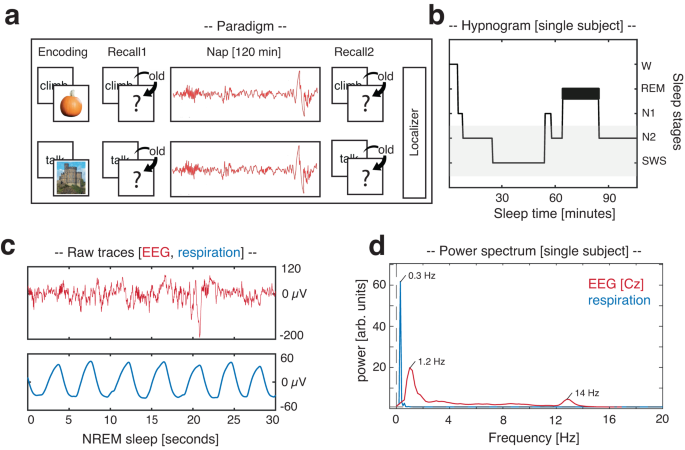2023-12-18 ミュンヘン大学(LMU)
◆今回、この脳活動の中央調節が不明だったため、ベルリンのMax Planck研究所とオックスフォード大学の科学者と協力してデータを再分析。その結果、呼吸が潜在的なペースメーカーであることが判明し、「呼吸は睡眠中の記憶強化に影響する」と語りました。シュライナー博士は、呼吸と脳波パターンの結びつきが、覚醒時の認知と同様に睡眠中の記憶処理にも重要であることを強調し、将来的な介入法につながる可能性があると述べました。
<関連情報>
- https://www.lmu.de/en/newsroom/news-overview/news/memory-research-breathing-in-sleep-impacts-memory-processes.html
- https://www.nature.com/articles/s41467-023-43450-5
呼吸はヒトの睡眠振動と記憶の再活性化を調節する Respiration modulates sleep oscillations and memory reactivation in humans
Thomas Schreiner,Marit Petzka,Tobias Staudigl & Bernhard P. Staresina
Nature Communications Published:18 December 2023
DOI:https://doi.org/10.1038/s41467-023-43450-5

Abstract
The beneficial effect of sleep on memory consolidation relies on the precise interplay of slow oscillations and spindles. However, whether these rhythms are orchestrated by an underlying pacemaker has remained elusive. Here, we tested the relationship between respiration, which has been shown to impact brain rhythms and cognition during wake, sleep-related oscillations and memory reactivation in humans. We re-analysed an existing dataset, where scalp electroencephalography and respiration were recorded throughout an experiment in which participants (N = 20) acquired associative memories before taking a nap. Our results reveal that respiration modulates the emergence of sleep oscillations. Specifically, slow oscillations, spindles as well as their interplay (i.e., slow-oscillation_spindle complexes) systematically increase towards inhalation peaks. Moreover, the strength of respiration – slow-oscillation_spindle coupling is linked to the extent of memory reactivation (i.e., classifier evidence in favour of the previously learned stimulus category) during slow-oscillation_spindles. Our results identify a clear association between respiration and memory consolidation in humans and highlight the role of brain-body interactions during sleep.

